关于鲁迅的英文简介
- 格式:doc
- 大小:37.50 KB
- 文档页数:10
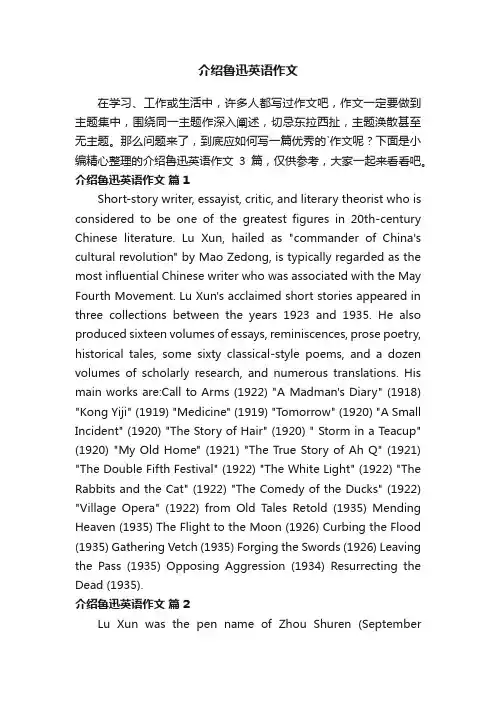
介绍鲁迅英语作文在学习、工作或生活中,许多人都写过作文吧,作文一定要做到主题集中,围绕同一主题作深入阐述,切忌东拉西扯,主题涣散甚至无主题。
那么问题来了,到底应如何写一篇优秀的`作文呢?下面是小编精心整理的介绍鲁迅英语作文3篇,仅供参考,大家一起来看看吧。
介绍鲁迅英语作文篇1Short-story writer, essayist, critic, and literary theorist who is considered to be one of the greatest figures in 20th-century Chinese literature. Lu Xun, hailed as "commander of China's cultural revolution" by Mao Zedong, is typically regarded as the most influential Chinese writer who was associated with the May Fourth Movement. Lu Xun's acclaimed short stories appeared in three collections between the years 1923 and 1935. He also produced sixteen volumes of essays, reminiscences, prose poetry, historical tales, some sixty classical-style poems, and a dozen volumes of scholarly research, and numerous translations. His main works are:Call to Arms (1922) "A Madman's Diary" (1918) "Kong Yiji" (1919) "Medicine" (1919) "Tomorrow" (1920) "A Small Incident" (1920) "The Story of Hair" (1920) " Storm in a Teacup" (1920) "My Old Home" (1921) "The True Story of Ah Q" (1921) "The Double Fifth Festival" (1922) "The White Light" (1922) "The Rabbits and the Cat" (1922) "The Comedy of the Ducks" (1922) "Village Opera" (1922) from Old Tales Retold (1935) Mending Heaven (1935) The Flight to the Moon (1926) Curbing the Flood (1935) Gathering Vetch (1935) Forging the Swords (1926) Leaving the Pass (1935) Opposing Aggression (1934) Resurrecting the Dead (1935).介绍鲁迅英语作文篇2Lu Xun was the pen name of Zhou Shuren (September25,1881 – October 19,1936) is one of the major Chinese writers of the 20th century.Considered by many to be the founder of modern Chinese literature,he wrote in baihua (白话) (the vernacular) as well as classical Chinese.Lu Xun was a short story writer,editor,translator,critic,essayist and poet.In the 1930s he became the titular head of the Chinese League of Left-Wing Writers in Shanghai.Lu Xun's works exerted a very substantial influence after the May Fourth Movement to such a point that he was lionized by the Communist regime after 1949.Mao Zedong himself was a lifelong admirer of Lu Xun's works.Though sympathetic to the ideals of the Left,Lu Xun never actually joined the Chinese Communist Party.Lu Xun's works are known to English readers through numerous translations,especially Selected Stories of Lu Hsun translated by Yang Hsien-yi and Gladys Yang.介绍鲁迅英语作文篇3Short-story writer, essayist, critic, and literary theorist who is considered to be one of the greatest figures in 20th-century Chinese literature. Lu Xun, hailed as "commander of China's cultural revolution" by Mao Zedong, is typically regarded as the most influential Chinese writer who was associated with the May Fourth Movement. Lu Xun's acclaimed short stories appeared in three collections between the years 1923 and 1935. He also produced sixteen volumes of essays, reminiscences, prose poetry, historical tales, some sixty classical-style poems, and a dozen volumes of scholarly research, and numerous translations.His main works are:Call to Arms (1922) "A Madman's Diary" (1918) "Kong Yiji" (1919) "Medicine" (1919) "Tomorrow" (1920) "A Small Incident" (1920) "The Story of Hair" (1920) " Storm in a Teacup" (1920) "My Old Home" (1921) "The True Story of Ah Q"(1921) "The Double Fifth Festival" (1922) "The White Light" (1922) "The Rabbits and the Cat" (1922) "The Comedy of the Ducks" (1922) "Village Opera" (1922) from Old Tales Retold (1935) Mending Heaven (1935) The Flight to the Moon (1926) Curbing the Flood (1935) Gathering Vetch (1935) Forging the Swords (1926) Leaving the Pass (1935) Opposing Aggression (1934) Resurrecting the Dead (1935)。
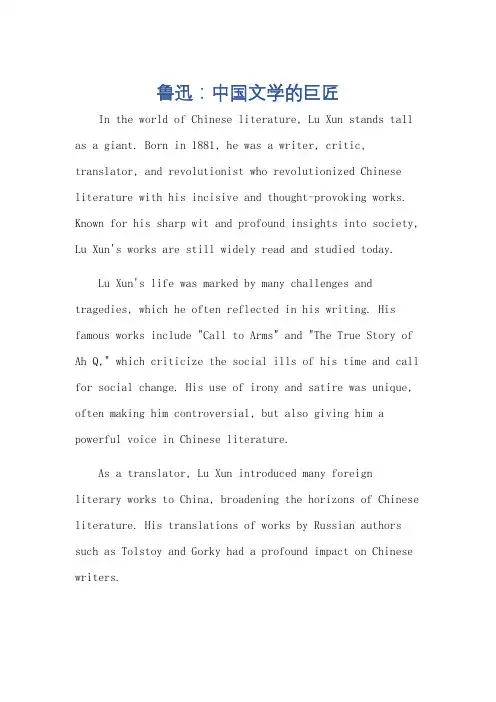
鲁迅:中国文学的巨匠In the world of Chinese literature, Lu Xun stands tall as a giant. Born in 1881, he was a writer, critic, translator, and revolutionist who revolutionized Chinese literature with his incisive and thought-provoking works. Known for his sharp wit and profound insights into society, Lu Xun's works are still widely read and studied today.Lu Xun's life was marked by many challenges and tragedies, which he often reflected in his writing. His famous works include "Call to Arms" and "The True Story of Ah Q," which criticize the social ills of his time and call for social change. His use of irony and satire was unique, often making him controversial, but also giving him a powerful voice in Chinese literature.As a translator, Lu Xun introduced many foreignliterary works to China, broadening the horizons of Chinese literature. His translations of works by Russian authors such as Tolstoy and Gorky had a profound impact on Chinese writers.Lu Xun's impact on Chinese literature and society is immeasurable. His works continue to inspire and challenge readers, making him a timeless figure in Chinese culture. His legacy lives on in the hearts and minds of millions of Chinese people.鲁迅,中国文学界的巨匠。
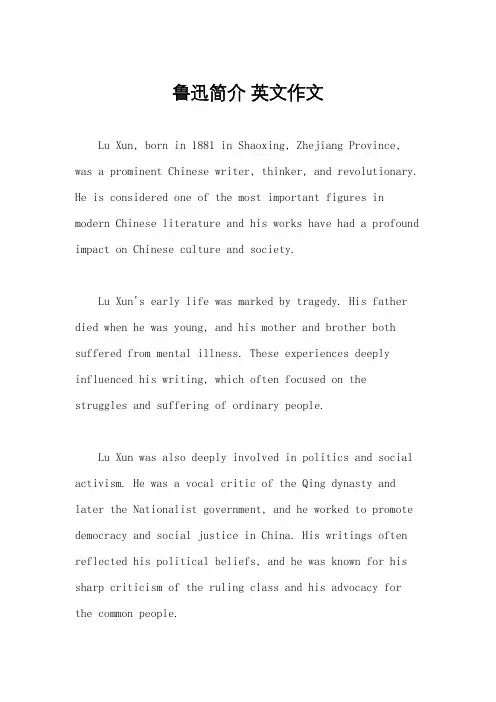
鲁迅简介英文作文Lu Xun, born in 1881 in Shaoxing, Zhejiang Province, was a prominent Chinese writer, thinker, and revolutionary. He is considered one of the most important figures in modern Chinese literature and his works have had a profound impact on Chinese culture and society.Lu Xun's early life was marked by tragedy. His father died when he was young, and his mother and brother both suffered from mental illness. These experiences deeply influenced his writing, which often focused on the struggles and suffering of ordinary people.Lu Xun was also deeply involved in politics and social activism. He was a vocal critic of the Qing dynasty and later the Nationalist government, and he worked to promote democracy and social justice in China. His writings often reflected his political beliefs, and he was known for his sharp criticism of the ruling class and his advocacy for the common people.Despite his many accomplishments, Lu Xun was also a deeply conflicted and troubled individual. He struggled with depression and alcoholism throughout his life, and his personal relationships were often fraught with tension and conflict. Nevertheless, his legacy as a writer and thinker remains an enduring part of Chinese culture and history.Lu Xun's impact on Chinese literature and culture cannot be overstated. His works, which include short stories, essays, and translations, are widely read and studied in China and around the world. His writing style, which is characterized by its clarity, simplicity, and realism, has influenced generations of Chinese writers and has helped to shape the modern Chinese literary tradition.In addition to his literary achievements, Lu Xun's social and political activism has also had a lasting impact on Chinese society. His advocacy for democracy and social justice helped to lay the groundwork for the Chinese Communist Revolution, and his legacy continues to inspire activists and reformers to this day.In conclusion, Lu Xun was a complex and multifaceted figure who made significant contributions to Chinese literature, culture, and society. His works continue to be read and studied today, and his legacy as a writer, thinker, and activist remains an important part of Chinese history.。
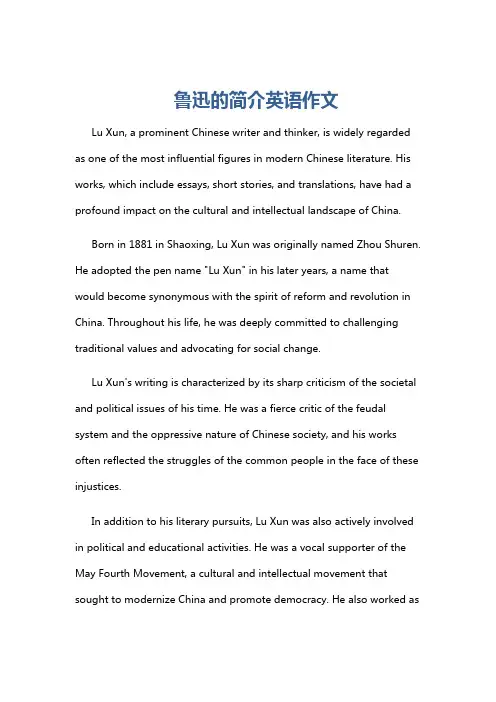
鲁迅的简介英语作文Lu Xun, a prominent Chinese writer and thinker, is widely regarded as one of the most influential figures in modern Chinese literature. His works, which include essays, short stories, and translations, have had a profound impact on the cultural and intellectual landscape of China.Born in 1881 in Shaoxing, Lu Xun was originally named Zhou Shuren. He adopted the pen name "Lu Xun" in his later years, a name that would become synonymous with the spirit of reform and revolution in China. Throughout his life, he was deeply committed to challenging traditional values and advocating for social change.Lu Xun's writing is characterized by its sharp criticism of the societal and political issues of his time. He was a fierce critic of the feudal system and the oppressive nature of Chinese society, and his works often reflected the struggles of the common people in the face of these injustices.In addition to his literary pursuits, Lu Xun was also actively involved in political and educational activities. He was a vocal supporter of the May Fourth Movement, a cultural and intellectual movement that sought to modernize China and promote democracy. He also worked asa lecturer and editor, using his platform to disseminate his ideas and promote social reform.Despite facing numerous challenges and setbacks in his lifetime, Lu Xun's legacy continues to endure. His writings remain an integral part of Chinese literary canon, and his ideas continue to inspire generations of writers, thinkers, and activists. Lu Xun's uncompromising commitment to truth and justice has solidified his place as a towering figure in the history of modern China.。
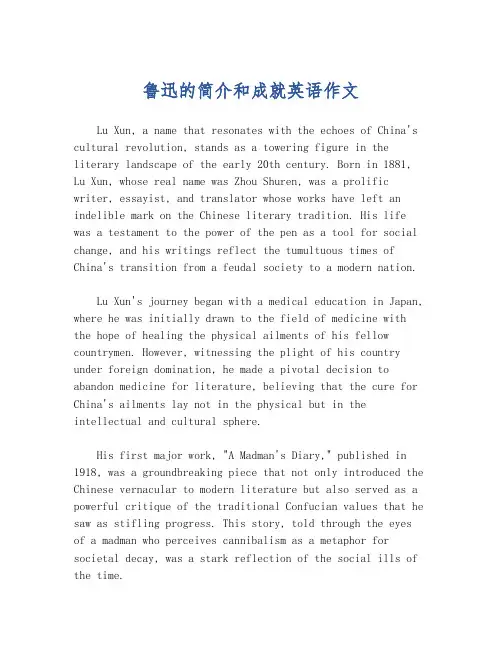
鲁迅的简介和成就英语作文Lu Xun, a name that resonates with the echoes of China's cultural revolution, stands as a towering figure in the literary landscape of the early 20th century. Born in 1881, Lu Xun, whose real name was Zhou Shuren, was a prolific writer, essayist, and translator whose works have left an indelible mark on the Chinese literary tradition. His life was a testament to the power of the pen as a tool for social change, and his writings reflect the tumultuous times of China's transition from a feudal society to a modern nation.Lu Xun's journey began with a medical education in Japan, where he was initially drawn to the field of medicine with the hope of healing the physical ailments of his fellow countrymen. However, witnessing the plight of his country under foreign domination, he made a pivotal decision to abandon medicine for literature, believing that the cure for China's ailments lay not in the physical but in the intellectual and cultural sphere.His first major work, "A Madman's Diary," published in 1918, was a groundbreaking piece that not only introduced the Chinese vernacular to modern literature but also served as a powerful critique of the traditional Confucian values that he saw as stifling progress. This story, told through the eyes of a madman who perceives cannibalism as a metaphor for societal decay, was a stark reflection of the social ills of the time.Lu Xun's oeuvre is vast and varied, encompassing short stories, essays, and translations that collectively paint a vivid picture of a society in flux. His collection of short stories, "Call to Arms," and "Wandering," further cemented his reputation as a master storyteller, with tales that are at once poignant and incisive, capturing the struggles and aspirations of the common people.Beyond his literary contributions, Lu Xun was also a fervent advocate for social reform and a critic of the oppressive feudal system. His essays, such as "Real Art," championed the cause of realism in literature and the importance of art as a medium for expressing the realities of life.Lu Xun's legacy extends beyond his literary achievements; he was a mentor to a generation of writers and intellectuals who would go on to shape the cultural and political discourse of modern China. His influence can be felt in the works of many contemporary Chinese writers, who continue to draw inspiration from his commitment to social justice and his unwavering belief in the transformative power of literature.In conclusion, Lu Xun's life and work are a beacon of intellectual and cultural enlightenment, a reminder that literature can be a catalyst for change and a force for good in society. His writings continue to inspire and challenge readers, ensuring that his voice remains a vital part of the global literary dialogue.。
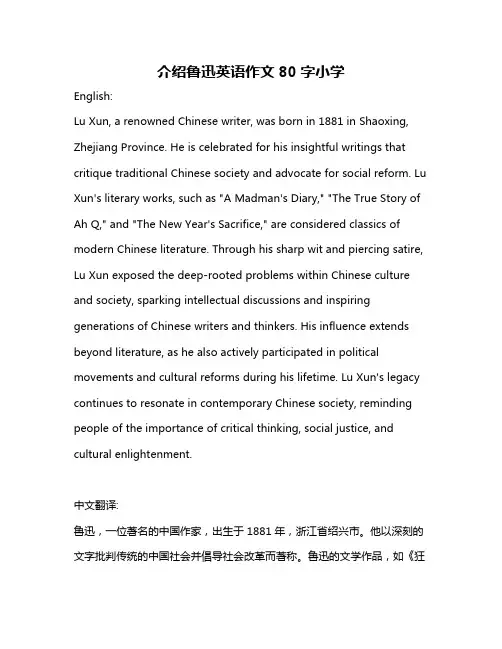
介绍鲁迅英语作文80字小学English:Lu Xun, a renowned Chinese writer, was born in 1881 in Shaoxing, Zhejiang Province. He is celebrated for his insightful writings that critique traditional Chinese society and advocate for social reform. Lu Xun's literary works, such as "A Madman's Diary," "The True Story of Ah Q," and "The New Year's Sacrifice," are considered classics of modern Chinese literature. Through his sharp wit and piercing satire, Lu Xun exposed the deep-rooted problems within Chinese culture and society, sparking intellectual discussions and inspiring generations of Chinese writers and thinkers. His influence extends beyond literature, as he also actively participated in political movements and cultural reforms during his lifetime. Lu Xun's legacy continues to resonate in contemporary Chinese society, reminding people of the importance of critical thinking, social justice, and cultural enlightenment.中文翻译:鲁迅,一位著名的中国作家,出生于1881年,浙江省绍兴市。
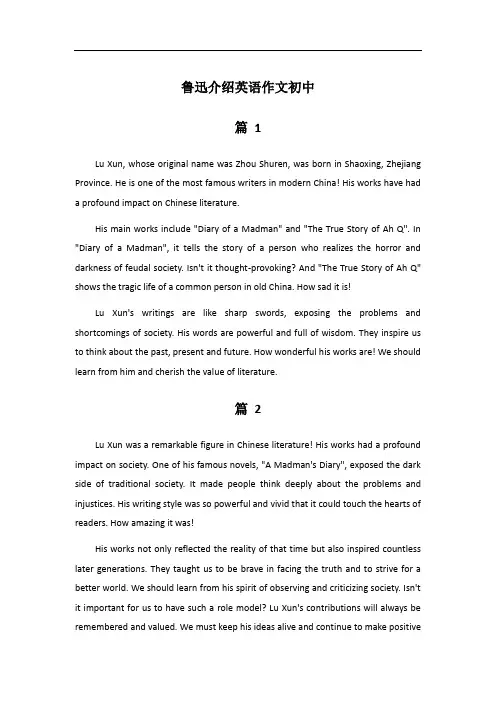
鲁迅介绍英语作文初中篇 1Lu Xun, whose original name was Zhou Shuren, was born in Shaoxing, Zhejiang Province. He is one of the most famous writers in modern China! His works have had a profound impact on Chinese literature.His main works include "Diary of a Madman" and "The True Story of Ah Q". In "Diary of a Madman", it tells the story of a person who realizes the horror and darkness of feudal society. Isn't it thought-provoking? And "The True Story of Ah Q" shows the tragic life of a common person in old China. How sad it is!Lu Xun's writings are like sharp swords, exposing the problems and shortcomings of society. His words are powerful and full of wisdom. They inspire us to think about the past, present and future. How wonderful his works are! We should learn from him and cherish the value of literature.篇 2Lu Xun was a remarkable figure in Chinese literature! His works had a profound impact on society. One of his famous novels, "A Madman's Diary", exposed the dark side of traditional society. It made people think deeply about the problems and injustices. His writing style was so powerful and vivid that it could touch the hearts of readers. How amazing it was!His works not only reflected the reality of that time but also inspired countless later generations. They taught us to be brave in facing the truth and to strive for a better world. We should learn from his spirit of observing and criticizing society. Isn't it important for us to have such a role model? Lu Xun's contributions will always be remembered and valued. We must keep his ideas alive and continue to make positivechanges in our society!篇 3Lu Xun is one of the most remarkable writers in China! His literary works have a profound influence on Chinese literature. His writing style is sharp and incisive. For example, in his novel "A Madman's Diary", he exposed the dark and cruel nature of feudal society with a bold and uncompromising attitude. How powerful his words are! His descriptions are so vivid that they make readers feel the pain and oppression of that era. He was not afraid to point out the shortcomings and problems of society. He used his pen as a weapon to fight against injustice and ignorance. Isn't it amazing? His works are not only a reflection of society but also a call for people to think and change. Lu Xun's literary achievements will always shine in the history of Chinese literature. How can we not admire such a great writer?篇 4Lu Xun was one of the most outstanding writers in China. Born in 1881, he experienced many difficulties in his life. But he never gave up his pursuit of literature! His works are like bright stars in the night sky, shining with wisdom and truth.Even in the face of a harsh environment and numerous challenges, Lu Xun persisted in his writing. Imagine that he was often poor and ill, yet he still held the pen tightly, as if it were his most powerful weapon! How amazing and inspiring it is!He wrote many famous works, such as "The True Story of Ah Q", which deeply reflected the social reality at that time. His words were like sharp arrows, piercing through the false and ugly phenomena.Lu Xun's love for literature was unwavering. His spirit of perseverance and his dedication to truth will always inspire us. How could we not admire such a great writer?篇 5Lu Xun was one of the greatest writers and thinkers in modern China. His works have had a profound impact on Chinese literature and society! His writing style was sharp and incisive, aiming to expose the dark sides of society. For example, in his famous novel "A Madman's Diary", he criticized the feudal ethical code and the ignorance and numbness of people at that time. How powerful and thought-provoking it was! Lu Xun's words were like a bright light, shining through the darkness and making people wake up. His works not only reflected the reality of society but also inspired people to think and strive for change. Isn't it amazing how he could do that with his pen? His spirit of caring for the country and the people is worth learning and remembering forever. We should always remember his contributions and keep his spirit alive in our hearts!。
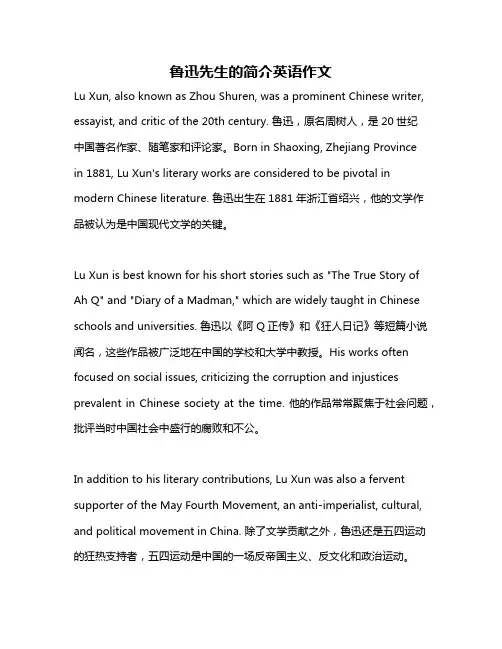
鲁迅先生的简介英语作文Lu Xun, also known as Zhou Shuren, was a prominent Chinese writer, essayist, and critic of the 20th century. 鲁迅,原名周树人,是20世纪中国著名作家、随笔家和评论家。
Born in Shaoxing, Zhejiang Provincein 1881, Lu Xun's literary works are considered to be pivotal in modern Chinese literature. 鲁迅出生在1881年浙江省绍兴,他的文学作品被认为是中国现代文学的关键。
Lu Xun is best known for his short stories such as "The True Story of Ah Q" and "Diary of a Madman," which are widely taught in Chinese schools and universities. 鲁迅以《阿Q正传》和《狂人日记》等短篇小说闻名,这些作品被广泛地在中国的学校和大学中教授。
His works often focused on social issues, criticizing the corruption and injustices prevalent in Chinese society at the time. 他的作品常常聚焦于社会问题,批评当时中国社会中盛行的腐败和不公。
In addition to his literary contributions, Lu Xun was also a fervent supporter of the May Fourth Movement, an anti-imperialist, cultural, and political movement in China. 除了文学贡献之外,鲁迅还是五四运动的狂热支持者,五四运动是中国的一场反帝国主义、反文化和政治运动。
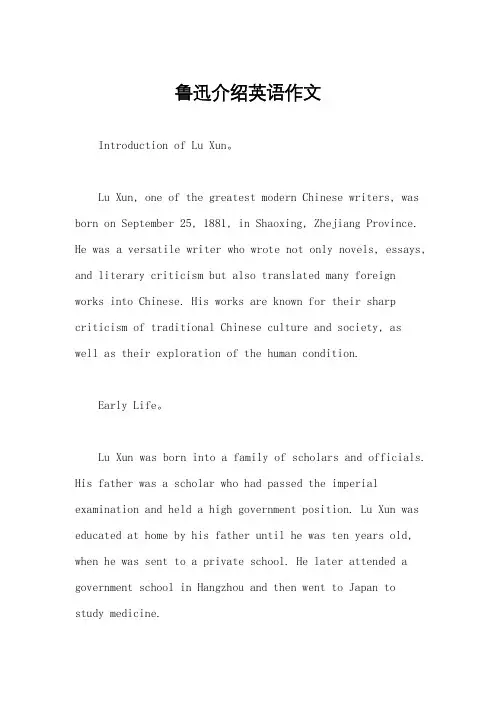
鲁迅介绍英语作文Introduction of Lu Xun。
Lu Xun, one of the greatest modern Chinese writers, was born on September 25, 1881, in Shaoxing, Zhejiang Province. He was a versatile writer who wrote not only novels, essays, and literary criticism but also translated many foreign works into Chinese. His works are known for their sharp criticism of traditional Chinese culture and society, aswell as their exploration of the human condition.Early Life。
Lu Xun was born into a family of scholars and officials. His father was a scholar who had passed the imperial examination and held a high government position. Lu Xun was educated at home by his father until he was ten years old, when he was sent to a private school. He later attended a government school in Hangzhou and then went to Japan to study medicine.Writing Career。
Lu Xun's writing career began in 1918 when he published his first essay, "Diary of a Madman," which is considered one of the first modern Chinese stories. He continued to write essays, short stories, and novels throughout his life, including "The True Story of Ah Q," "A Madman's Diary," and "The New Year's Sacrifice."Lu Xun's works are known for their sharp criticism of traditional Chinese culture and society. He believed that China needed to undergo a cultural and social revolution in order to modernize and become a strong nation. He was also deeply concerned with the human condition and explored themes such as alienation, loneliness, and despair.Legacy。
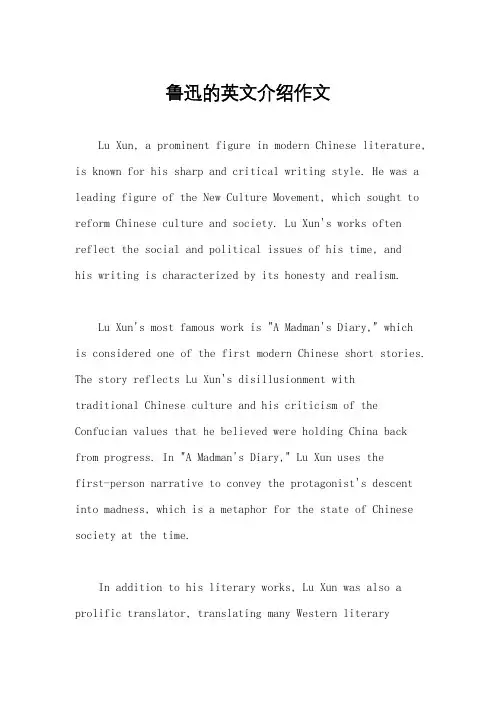
鲁迅的英文介绍作文Lu Xun, a prominent figure in modern Chinese literature, is known for his sharp and critical writing style. He was a leading figure of the New Culture Movement, which sought to reform Chinese culture and society. Lu Xun's works often reflect the social and political issues of his time, andhis writing is characterized by its honesty and realism.Lu Xun's most famous work is "A Madman's Diary," whichis considered one of the first modern Chinese short stories. The story reflects Lu Xun's disillusionment withtraditional Chinese culture and his criticism of the Confucian values that he believed were holding China back from progress. In "A Madman's Diary," Lu Xun uses thefirst-person narrative to convey the protagonist's descent into madness, which is a metaphor for the state of Chinese society at the time.In addition to his literary works, Lu Xun was also a prolific translator, translating many Western literaryworks into Chinese. He believed that the translation of foreign literature was essential for the modernization of Chinese literature and culture. Lu Xun's translations introduced Chinese readers to the works of authors such as Gogol, Tolstoy, and Ibsen, and had a significant impact on the development of Chinese literature.Lu Xun's writing style is characterized by its directness and simplicity. He often used vernacular Chinese in his writing, which was a departure from the classical Chinese style that was prevalent at the time. This choice of language made his works more accessible to a wider audience and contributed to his influence on the development of modern Chinese literature.Overall, Lu Xun's contributions to Chinese literature and culture are invaluable. His critique of traditional Chinese values and his advocacy for social reform have left a lasting impact on Chinese society. Lu Xun's writing continues to be studied and appreciated both in China and internationally, and he remains a revered figure in the history of Chinese literature.。
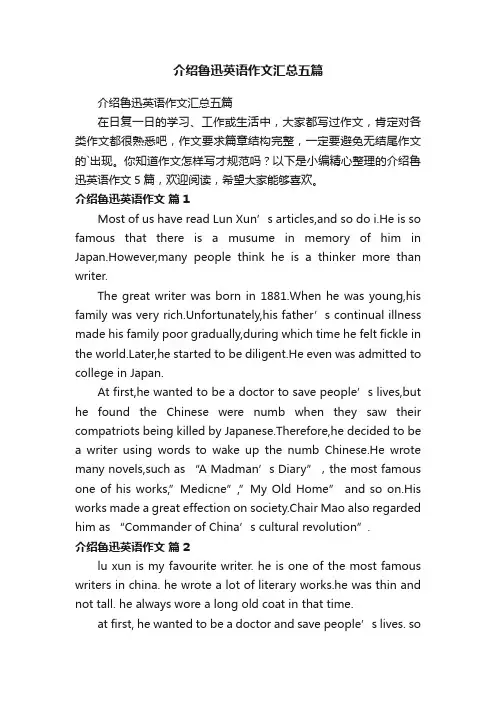
介绍鲁迅英语作文汇总五篇介绍鲁迅英语作文汇总五篇在日复一日的学习、工作或生活中,大家都写过作文,肯定对各类作文都很熟悉吧,作文要求篇章结构完整,一定要避免无结尾作文的`出现。
你知道作文怎样写才规范吗?以下是小编精心整理的介绍鲁迅英语作文5篇,欢迎阅读,希望大家能够喜欢。
介绍鲁迅英语作文篇1Most of us have read Lun Xun’s a rticles,and so do i.He is so famous that there is a musume in memory of him in Japan.However,many people think he is a thinker more than writer.The great writer was born in 1881.When he was young,his family was very rich.Unfortunately,his father’s continu al illness made his family poor gradually,during which time he felt fickle in the ter,he started to be diligent.He even was admitted to college in Japan.At first,he wanted to be a doctor to save people’s lives,but he found the Chinese were numb when they saw their compatriots being killed by Japanese.Therefore,he decided to be a writer using words to wake up the numb Chinese.He wrote many novels,such as “A Madman’s Diary”,the most famous one of his works,”Medicne”,”My Old Home” and so on.His works made a great effection on society.Chair Mao also regarded him as “Commander of China’s cultural revolution”.介绍鲁迅英语作文篇2lu xun is my favourite writer. he is one of the most famous writers in china. he wrote a lot of literary works.he was thin and not tall. he always wore a long old coat in that time.at first, he wanted to be a doctor and save people’s lives. sohe learned medicine, but later he found the chinese were in sensitive when they faced the oppression of their enemies. so he began to write articles to wake the people up. lu xun wrote some famous novels, he attacked the social mores in that time, and in his works, many persons were known very well, such as “ah q”“kong yi ji”.i like lu xun because i also want to be a great writer like him.i like reading and writing, and i often write some articles in my free time. though i don’t have good literary talent or a large vocabulary, i spend lots of time reading and writing to improve my writing skills.lu xun is my hero, i will learn more from him. i believe i can be a great writer like him in the future.as it is known to us all ,luxun is a famous chinese writer. he is not only a writer, thinker, but also the founder of chinese literature . he wrote many classic novels and his stories, which are translated many languages, were made into film,such as the true story of ah q and the new year's sacrifice,which deeply showed people's suffering in the old days.because of his achievement to chinese literature, chairman mao spoke highly of him. besides, some of his works were selected into the text books in high school and university. i think you'll gain a lot from reading his works.介绍鲁迅英语作文篇3Lu Xun, formerly known as Zhou Shuren, was China's famous writer, thinker, critic and revolutionist. He had high literary achievements and he was the pioneer of modern Chinese literature, having profound impact on Chinese literature after the May Fourth Movement. His novels have been translated into many language versions and were made into movies. Forinstance, The True Story of AH Q(《阿Q正传》) and The New Year's Sacrifice(《祝福》)profoundly exposed the problems of the old society. Present Mao spoke highly of him. Some of his works were elected to the middle school and college textbooks. It's very beneficial to read Lu Xun's works.介绍鲁迅英语作文篇4Short-story writer, essayist, critic, and literary theorist who is considered to be one of the greatest figures in 20th-century Chinese literature. Lu Xun, hailed as "commander of China's cultural revolution" by Mao Zedong, is typically regarded as the most influential Chinese writer who was associated with the May Fourth Movement. Lu Xun's acclaimed short stories appeared in three collections between the years 1923 and 1935. He also produced sixteen volumes of essays, reminiscences, prose poetry, historical tales, some sixty classical-style poems, and a dozen volumes of scholarly research, and numerous translations.His main works are:Call to Arms (1922) "A Madman's Diary" (1918) "Kong Yiji" (1919) "Medicine" (1919) "Tomorrow" (1920) "A Small Incident" (1920) "The Story of Hair" (1920) " Storm in a Teacup" (1920) "My Old Home" (1921) "The True Story of Ah Q" (1921) "The Double Fifth Festival" (1922) "The White Light" (1922) "The Rabbits and the Cat" (1922) "The Comedy of the Ducks" (1922) "Village Opera" (1922) from Old Tales Retold (1935) Mending Heaven (1935) The Flight to the Moon (1926) Curbing the Flood (1935) Gathering Vetch (1935) Forging the Swords (1926) Leaving the Pass (1935) Opposing Aggression (1934) Resurrecting the Dead (1935)介绍鲁迅英语作文篇5As it is known to us all ,LuXun is a famous Chinese writer. He is not only a writer, thinker, but also the founder of ChineseLiterature . He wrote many classic (经典的)novels and his stories, which are translated many languages, were made into film,such as The True Story of AH Q and The New Year's Sacrifice,which deeply showed people's suffering in the old days.Because of his achievement to Chinese literature, Chairman Mao spoke highly of him. Besides, some of his works were selected into the text books in high school and university. I think you'll gain a lot from reading his works.。
关于鲁迅的英文简介鲁迅,著名文学家、思想家,五四新文化运动的重要参与者,中国现代文学的奠基人。
下面是为你整理的关于鲁迅的英文简介,希望对你有用!鲁迅简介Lu Xun (September 25, 1881 - October 19, 1936), formerly known as Zhou Zhushou, later renamed Zhou Shuren, the word Yu Shan, after the change only, "Lu Xun" is his 1918 published "Madman Diary" But also his most influential pen name, Zhejiang Shaoxing people. Famous writer, thinker, an important participant of the May 4th New Culture Movement, the founder of modern Chinese literature. Mao Zedong has commented: "Lu Xun's direction is the direction of the new culture of the Chinese nation."Lu Xun's life has made great contributions in many fields such as literary creation, literary criticism, thought research, literary history research, translation, introduction of art theory, introduction of basic science and ancient collation and research. He has a great influence on the development of Chinese social ideology and culture after the May FourthMovement, and has a great influence on the world literary world, especially in Korea and Japan. It is known as "the largest territory in the East Asian cultural map of the twentieth century Of the writer ".鲁迅人物经历TeenagerGuangxu seven years (1881 years) September 25 (summer calendar in the eighth day of August), was born in Shaoxing City, Zhejiang Dongchang Square new home door Zhou. Young name A Zhang, long root, Chang Geng, scientific name Zhou Zhushou.Guangxu eighteen years (1892), into the Sanwei book from the Shou mirror I read, after school pictures. And friendship with Zhang Run water.Guangxu nineteen years (1893), grandfather Zhou Choufu due to imprisonment, the father Zhou Boyi and seriously ill, family property in the fall, the whole family refuge in the countryside. Often for the father out of the quality shop and pharmacy, was cold eyes.Guangxu twenty years (1896), his father died. Hardships. Write diary this year.Guangxu twenty-three years (1897), the family meeting room, assigned to Lu Xun their both poor and small, Lu Xunrefused to sign by the uncle who denounced, feel the world of cool.Struggling to studyGuangxu twenty-four years (1898), in April, into the Nanjing Navy School, renamed Zhou Shuren. In December, by his family to urge to participate in the county test, after the list to four younger children on the grounds no longer participate in the government test, continue to go to Nanjing to study.Guangxu twenty-five years (1899) into the Jiangnan Lu Shi school attached to the mining railway school, learn mining. This period of contact with Huxley's "Evolution and Ethics", on his future thinking has a certain impact. In addition to reading the new book, love riding a horse, dare to fight with the children of the flag horse race.Guangxu twenty-eight years (1902) in January, mine school graduate. In March, the public went to Japan to study. April, into the Hongwen College General Gang Jiangnan class (for Japanese learning crash course).Twenty nine years Guangxu (1903) cut braids. After school classics read the philosophy and literature of the book, especially attention to human nature and national issues.Guangxu three decades (1904), in April, graduated from Hongwen College. In June, grandfather Anfu died, sixty-eight years. In September, into Sendai Medical College.Guangxu thirty-two years (1906), January, class "Russo-Japanese war education film", by the stimulation, decided to abandon the medical from the text. In June, the school will be included in the German School of the Tokyo Independence Association. Summer and autumn, cheated to go home and married. Immediately returned to Japan, in July, from Sendai back to Tokyo, no longer school, specializing in literary translation work, after a few years through different ways to learn German, Russian.Guangxu thirty-four years (1908), from Mr. Zhang Taiyan study, as "Guanghuihui" members, and with the younger brother translated "foreign novel collection", during the hard life, proofreading book subsidy life.Xuantong first year (1909), "foreign novel collection" two published.ConfusedXuantong first year (1909) in August, returned to Hangzhou, Zhejiang two normal school physiology andchemistry teacher concurrently Japanese teacher Suzuki Guishou's botany translation.Xuantong two years (1910), in August, Ren Shaoxing secondary school teachers and supervisors. In 1911, write the first novel of the novel "nostalgia".The first year of the Republic of China (1912), the provisional government was established in Nanjing, should be invited by the chief education officer Cai Yuanpei, the Ministry of Education Department of Social Education, the first section chief. August appointed ministry for ministry of ministry. From this year to 1917, he copied a large number of monuments, recorded inscriptions rubbings, proofreading ancient books, which also carried out a certain study of Buddhist thought.In six years (1917), July 7, due to Zhang Xun restoration chaos, anger and leave, 14, chaos is to return to the Department.In seven years (1918), in January, to participate in the "new youth" reorganization, any editorial board.Literary forewordIn the seven years (1918) in May, Lu Xun for the pen name published in the history of modern Chinese literature with the modern creation of the vernacular short story "MadmanDiary", contained in the "New Youth" Volume IV fifth.In 19 years, in the Peking University, Beijing higher normal school teaching Chinese novel history, in June, read the "Communist Manifesto" Chinese translation praised the translator. In September, published the novel "storm".In the twelve years (1923), in August, the novel set "cry" published; with his brother Zhou Zuoren separated, moved to the West four tower alley 61 residence, separation reasons unknown. December, as "how to do after the Nora" speech, part-time female teacher, Esperanto school teachers; "Chinese novel history" published on the book.In 19 years (1924), in July, went to Xi'an to speak "the historical changes in Chinese novels." August to Beijing. In November, "language silk" published weekly, Lu Xun published in the first issue of "on the fall of the pagoda", since Lu Xun became "language silk" one of the main group of writers.Democratic warriorIn 1940 (1925), "Women's big wave" tofurther upgrade, Lu Xun because of support for the progressive struggle of students to be educated chief Zhang Zhizhao exempt Qian Qian duties, the same year, Lu Xun to the Peace Court sued Zhang Shizhao.In fifteen years (1926), March, "March 8 tragedy" occurred. In April, Lu Xun as "dead" "remember Liu and Zhen Jun" and other criticism of Duan Qirui government slaughter of students of the crime, was hunt, refuge in Yamamoto hospital. During the evacuation period, August, "Wandering" published, went to Xiamen University Ren Guowen Department Professor. Resigned in December.In sixteen years (1927), in January went to Zhongshan University to teach. In March, with the CPC Guangdong and Guangxi Communist Party Secretary Chen Yannian met. April 1, went to the Whampoa Military Academy delivered a speech "revolutionary era of literature", 12, "four one two anti-revolutionary coup" occurred on the 29th, rescue students failed to resign. August, published "Wei Jin style and articles and medicine and wine relationship." September, sent a letter to Taiwan static farmers, refused as a Nobel Prize winner, left Guangzhou toShanghai, and Xu Guangping in Shanghai began living together. In December, and Liang Shiqiu and others on the "third person", "free man" controversy, the two sides argue lasting, great impact.In seventeen years (1928), spring, to participate in the Chinese revolution and mutual aid. This year, with the creative society, most members of the sun community on the "revolutionary literature" issue debate. It is a large number of years to collect Marxist works and translate it. At the same time began to promote revolutionary art, advocate modern wood carvings.In 18 years (1929), September 27, Xu Guangping son, Lu Xun named "Zhou Haiying." At the end of the year, with Feng Xuefeng many consultations to form the "Chinese left - wing writers Union.Left main leagueIn 19 years (1930), in February, China's free movement alliance established, as one of the promoters. March 2, attended the establishment of the Chinese left-wing writers Union, was elected as the Standing Committee, as "the left-wing writers Union" speech.In twenty years (1931), January 20, Roushi was arrested, LuXun left refuge. 28 back to the old apartment.Republic of twenty-one years (1932), January 29, the case of war, in the line of fire. The next day to avoid the mountain bookstore. February 6, by the Neishan bookstore friendly escort sent to the British concession in the mountain branch to avoid. And Ai Qing, who initiated the "Spring Art Institute."In twenty-two years (1933), in January, Cai Yuanpei asked to join the "civil rights protection alliance", was cited as executive members. February 17, Cai Yuanpei invited to Song Ching Ling House, welcomed George Bernard Shaw. As "to forget the memorial" miss Roushi.In twenty-three years (1934), in January, and Zheng Zhenduo co-edited "Peking Ping spectrum" published. May, the order of the woodcut "cited jade set" published.Republic of twenty-four years (1935), in February began to translate Gori "dead soul". June, the integration of "new literature series novel collection" and made a long sequence.In twenty-five years (1936), in January, shoulder and ribs were painful, the last innovation for the "newstory" published. In February, began to translate "dead soul" second. May 15 re-onset, the doctor diagnosed stomach disease, since the fever healed, 31, Ms. Smedley Lai cited the United States Deng doctors to diagnose, the situation is not optimistic. In June, the body slightly improved, Lu Xun and people around that "Mr. Lu Xun good." October 17 disease recurrence, 18 days before the onset of disease, more than asthma. Died at 5:25 am on the 19th关于鲁迅的英文简介。